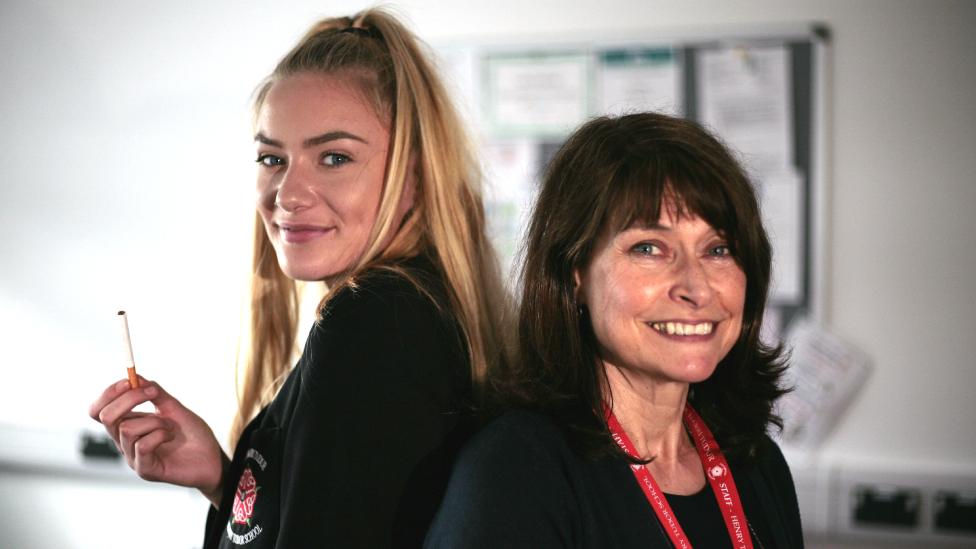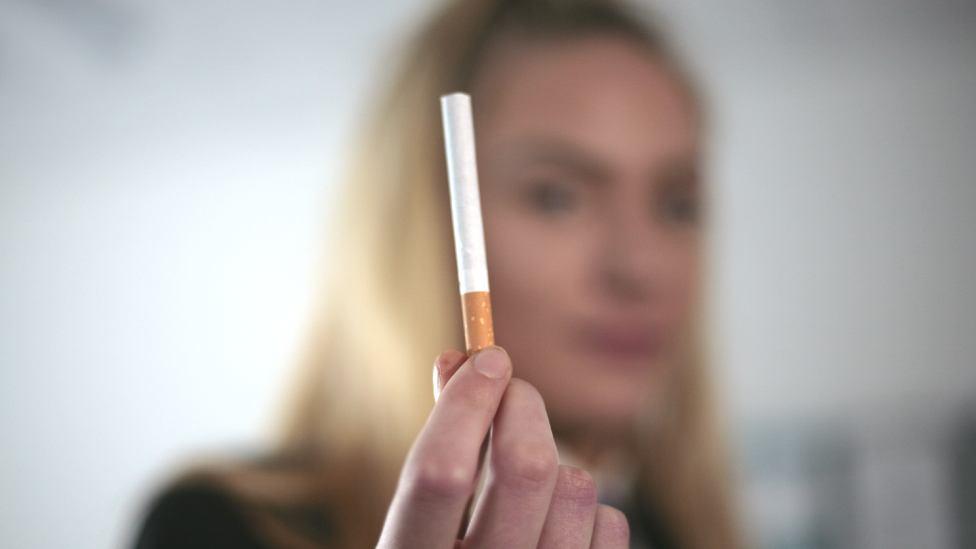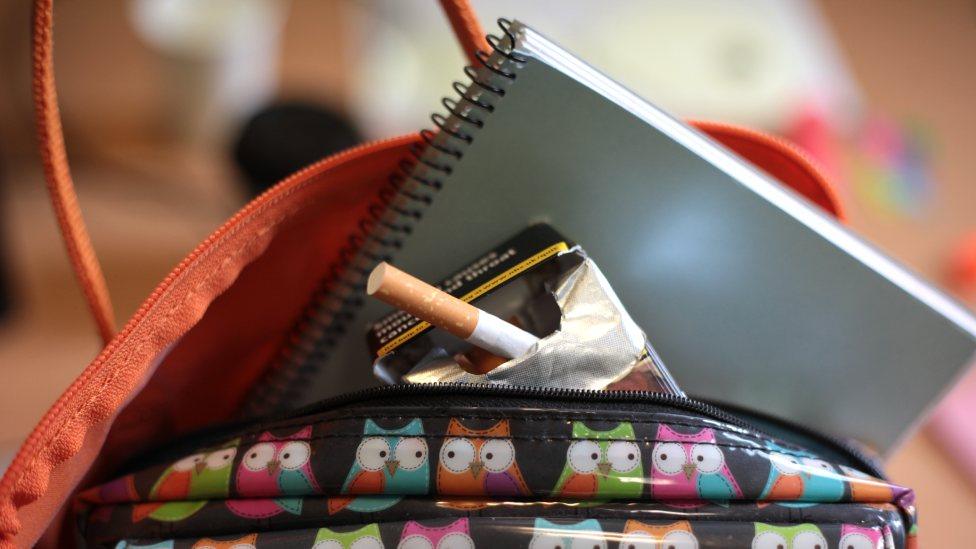Smoking: Lack of progress on teenage rate 'shocking'
- Published

Emma Howard (left) said the scheme set up by Henry Tudor School assistant headteacher, Ann Andrews (right) was a big help
"I hate it - I hate the smell of it, I hate the taste of it, I hate just everything about it."
For ex-smoker Emma Howard, 16, cigarettes now seem like a disgusting prospect.
But a recent survey of thousands of Year 11 pupils suggested the percentage who smoke regularly in Wales - about 9% - has not fallen since 2013-14, with the rate among poorer teenagers rising.
Ash Wales said this was "shocking" and called for a more targeted approach.
Public Health Wales (PHW) said it had a number of programmes aimed at tackling the problem and the percentage of "successfully treated smokers" was rising.
Emma kicked the habit after taking part in a scheme at her school, Henry Tudor School in Pembroke, run by Hywel Dda health board.
It saw a small group of Year 11 pupils given nicotine patches, lozenges and mints during the school day, with extra support to help them resist the urge to spark up.

PHW said the percentage of "successfully treated smokers in Wales" was steadily rising against a backdrop of reductions in England, Scotland and Northern Ireland
"It was a shock to be honest with you, I didn't expect them [school staff] to say, 'look we are going to help you'," Emma said.
"I expected them to say, 'there is a punishment, so if you do this then you're wrong and you're naughty', and I just think it was amazing that the staff actually helped us."
Emma started smoking at 13 because a group of her school friends did and, with members of her family also hooked, tobacco was always around.
But the school-based initiative helped because it meant she didn't have to go "cold turkey" from nicotine and could gradually wean herself off the craving.
The impetus for it came when the school closed as Pembroke School, moved to a new site and reopened in its current incarnation, assistant head, Ann Andrews, said.
"Our old site was very exposed and it was a much bigger footprint and there was no perimeter fence, so it was possible for pupils to sneak off places and have a cigarette a lot more easily than they would on site at our new school," she said.

Ash Wales says a "holistic, family-based" approach is needed to further tackle the different aspects of the problem
The school identified a small group of "committed" smokers who wanted to give up. They met those running the scheme in the summer holidays before it kicked off in the new year.
"I am an ex-smoker myself," Mrs Andrews said. "It is difficult to give up and when they are getting to Year 11 they are nearly 16 - some of them are 16 - they are going to have to make choices in adult life.
"They just need support to make the right choices really - we can't always do it on our own."
It is this kind of community or educationally-based scheme anti-smoking charity, Ash Wales, wants to see replicated.
The charity said it was "disappointed" and "shocked" about the results of the latest Cardiff University survey into Health Behaviour of School-Aged Children, for 2017-18.
It showed 9% of Year 11 pupils questioned smoked tobacco at least weekly - the same proportion from the last survey in 2013-14.

However, the proportion of those smoking regularly from the least affluent areas rose in the past four years (from 4% to 6%), while those from the most affluent communities stayed the same (3%).
The highest rates of weekly smoking were reported by adolescents from white Gypsy/traveller backgrounds, Pakistani and Arab backgrounds.
Suzanne Cass, chief executive of Ash Wales, said: "We need more resources, we need more evidence-based action, we need to make sure that actually we are targeting and we are measuring the progress in these poor communities on a more regular basis so that we know that the action we are taking is having an effect."
She praised the Welsh Government for bringing in "progressive tobacco controls", such as a proposed ban on smoking on the grounds of schools, playgrounds and hospitals.

PHW said it worked with the Welsh Government and the Tobacco Control Strategic Board - which includes Ash Wales - and delivered the JustB programme, external aimed at young people living in communities where smoking is more common.
Christian Heathcote-Elliott of PHW said: "Unfortunately, smoking is more common in communities with higher levels of disadvantage, but Wales' national Help Me Quit system is on hand to offer free NHS support and advice to help motivated smokers quit.
"With appropriate consent this service is available to children and young people from the age of 12 upwards."
Simon Clark, director of smokers' group Forest, said: "The best way to reduce smoking rates among teenagers is a combination of education and stiffer penalties for shopkeepers who sell cigarettes to children and adults who proxy purchase."
- Published22 May 2019

- Published6 October 2016

- Published17 January 2019
